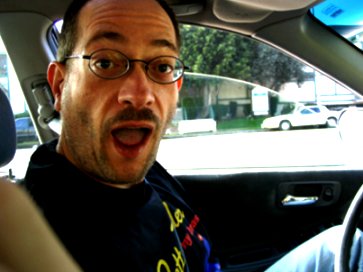Musical Insurgency
Volume 4 Book 2 of
Living in the Bonus Round
(Part 14)

Betty Barker, secretary to Joan Crawford.
Musical Insurgency
Volume 4 Book 2 of
Living in the Bonus Round
(Part 14)

Betty Barker, secretary to Joan Crawford.
[ Book 4-1 ] -- [ Pt 1 ] [ Pt 2 ] [ Pt 3 ] [ Pt 4 ] [ Pt 5 ] [ Pt 6 ] [ Pt 7 ] [ Pt 8 ]
[ Pt 9 ] [ Pt 10 ] [ Pt 11 ] [ Pt 12 ] [ Pt 13 ] [ Pt 14 ] -- [ Book 4-3 ]
December 18-20, 2004.
The World of The Song, Pt. 2.Got to hang with some old pals this week. First was Michael. He and I went shopping together at a big consumer electronics store. Put me in a department store and I'm bored silly. Stick me around electronics or musical instruments and I'm a goner. I could play around and shop stuff for hours.

Michael goofing for the camera.Jim and I also hooked up with one of his oldest pals, Betty Barker. Still as beautiful as ever (see pic above), we thought about her because she used to work for Howard Hughes when he took over RKO (who's in the news now because of the new movie, "The Aviator.")
We asked her about those days. "Well," she said in her reedy, high-pitched voice, "I was a secretary at RKO and he was looking for some girls and he picked me. He had six private secretaries. I was number two and a half."
We asked her what she thought of "The Aviator," hoping to get inside gossip or reaction. She said, "Well, it was kind of slow at first but then it very good. I think, though, that Leonardo DiCaprio just looked too young in those later scenes."
Everyone's a critic.

New Sunset & Vine shopping/condo thingy.Fun reaction to the diary entry yesterday. Had breakfast with my friend ERRRRnie yesterday. (That's how we pronounce his name). Went to some hot and happening place on Sunset Blvd. It had colored glass in the windows and the sun was shining brightly into the room.

My serious face.

Ernie has a great laugh.MAKING DEMOS
Ernie said that he works with a bunch of straightboy rock and roll musicians (the kind I used to be in a band with) and they all laughed and nodded in recognition at that post -- about those frustrating instances when one invests one's lifeblood into the writing, crafting, rehearsing, rewriting, re-rehearsing, recording of a song only to be met with an indifferent shrug.
You climb Mount Everest and they act as if you ran across the street for a cup of coffee.
Ever notice how you're in a room and someone will put on a record and then someone will say, "Oh, man. I love that song."
What they really mean "I love that record." They're responding to a recording, not just the song. (It's the difference between Aretha singing "R-E-S-P-E-C-T" versus William Shatner singing it.)
I think I might have mentioned a new song called "Holy Dirt." I wrote on our last cruise on this really great Yamaha grand. On the very last day, I invited these two really cool people, a young couple I might have mentioned before, into the Commodore Club so that I could play it for an audience for the first time to get a response.
When I finished the song, they literally could not move. We had an incredibly intense moment and it led to some heavy conversation because the song has a religio-political point of view about the irony of how when people designate something as "holy" -- whether it's land or an object or a person -- other people end up dead. It's like human nature is prone to worshipping and valuing their possesion of things more than they value life.
A simple thought, maybe. Debatable, maybe. But I think entirely relevant at a time when Holy Wars are going on all around us. But the combination of the incredibly beautiful and rich sound of the piano, the acoustics of the room giving my voice a little extra richness, maybe even just the moment, we had a transcendent moment together. For five minutes I felt like Neil Young or Bob Dylan.
So I get home, so excited to get this recorded. Spent unrelentingly long hours playing it, replaying it, recording it, etc. By now, I've trained most of my friends, but in the early days when I'd made a demo I got, "I don't like the vocals." Or, "Lousy drums." I had to tell them:
I already know the vocals suck and the drums are worthless sounding. I'm asking your opinion on the SONG, not the RECORD. I don't have a million dollars worth of equipment. I have a jury-rigged desktop (thanks to Ernie and Ken -- without whom I'd have nothing so I'm not complaining.) But still, I'm singing the vocals over a $1.50 computer mic -- one of those long thin kinds you see at Radio Shack or Frye's and I'm using free sound fonts downloaded from the Internet. Hell, if you listen closely to some of the vocal tracks on these things, you can even hear CNN blasting away. It's a valuable tool I've been able to use, but it still sounds unprofessional.
Paul Simon once talked about this, the difference between record and song, when he was interviewed by Paul Zollo in SongTalk Magazine. He recalled having written an album full of really well-written songs. Every critic admired his craft. But the RECORD tanked because, he said, sucked. He had good songs but felt he made a lousy record.
That's when Simon began, in his words, "making the record first." He would find sounds that really pleased his ears. Rhythms, beats, drums, exotic instruments, etc. and he would start building layers of sound that just felt good. After he was pleased with what he had created, he wrote the song on top of this bed. You can tell it when you listen to his later records made using South African or Brazilian sounds and beats. I love those records. Graceland was the first. He was back to selling in the millions.
Now, I'm saying all that to make the point that when people listen to a demo of mine and respond with a shrug, I don't -- do not -- immediately jump to the conclusion that it's a lousy song. It MIGHT be a lousy song, but after having spent hundreds of hours honing that song, I'm not going to toss it away based on a demo made with sub-professional equipment.
SOME day, if these songs are made into really good RECORDS, these demos might be a fun thing for people to listen to so they can see how those songs get born.
It's funny, though, for people like me who love SONGS (as opposed to RECORDS), I barely notice things like beats and sound. My ears tune it all out and focus in on the lyrics and "the song itself." It comes from my years of holding songwriting workshops. Young writers would sometimes try to cover up a bad song by overproducing it to death.
I learned to tune all that out and just listen to the basic architecture -- the lyrics, the melody, the structure, the chord progressions -- and nail them if they were trying to get away with bad writing. The late Nik Venet taught me that.
Of course, the kids used to hate me for it.
© 1996-2004 by Steve Schalchlin. You have permission to print from this diary and distribute for use in support groups, schools, or to just give to a friend. You do not have permission to sell it.